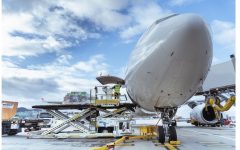
Sunil Kohli, Managing Director, Rahat Cargo says, “As our country is targeting to become a $7 trillion economy by 2030, the logistics industry is set to play the vital role of a growth engine which will catalyse to usher in the new era of economic progress. Therefore, the logistics industry requires consistency in policy, technology and an accelerated infrastructure-led reforms. Thus we expect an emphasize on the continuity and stability in the decision-making and policy measures which should be reflected in the upcoming Budget. The logistics industry expects the government to focus on reforms and proposals towards a continued capex push for transportation, port and digital infrastructure development to boost logistics efficiency and competitiveness in line with the vision and goals of National Logistics Policy. The full budget needs to continue with the infrastructure push to add momentum to the transformation-led growth. The industry requires a holistic infrastructure development push to build a stronger distribution network and global value chain linkages. In its strong resolve, the logistics industry is geared up and committed to contribute to the ‘Viksit Bharat @ 2047’ mission. Beyond infrastructure enhancements and tax reforms, there is an urgent need for strategic resource allocation to adapt to market dynamics, including fuel price fluctuations and supply chain disruptions. By investing in cutting-edge technology and aligning with global digitalization and sustainability standards, we can mitigate current challenges and position India as a leader in a tech-driven, efficient logistics sector on the global stage. Additionally, incentives for green logistics and digital infrastructure development will be key to achieving our long-term goals. Streamlining the GST system and encouraging sustainability by using electric cars and other eco-friendly activities is also essential. Innovation and growth will also be fuelled by assistance for SMEs, start- ups and skill development as well as by encouraging public-private collaborations and streamlining regulatory procedures. By addressing these issues, the industry will contribute more to India’s economic development. Additionally, the industry needs a tech boost, leveraging AI to streamline customs, improvise warehousing, and optimize every facet of the supply chain. . Simplifying and reducing the tax structure, particularly around GST, can help businesses manage their finances more efficiently and encourage more entrepreneurs to enter the market. Besides these, the industry is also looking at tax reforms, financial incentives, and incentives towards adoption of cutting-edge technology like AI.”
 Cargo Breaking News
Cargo Breaking News


